In January 2018, one could look back over the first year of the Trump administration and make a strong case that Trump’s foreign policy was defined more by his national security cabinet—particularly Secretary of Defense James Mattis and Secretary of State Rex Tillerson—than by the president himself.
Despite strong reservations, Trump grudgingly acceded to the advice of his cabinet in agreeing to keep U.S. troops in Afghanistan. Despite his exhortation to “bring me some tariffs,” Trump also opted to wait until his Department of Commerce and U.S. Trade Representative concluded related investigations. Notwithstanding his threats to abandon European allies skimping on defense spending, he eventually affirmed his support for NATO. And despite an unequivocal campaign commitment to rip up the Iran nuclear deal, Trump conceded to appeals from Tillerson and punted the day of reckoning.
On top of it all, in December 2017, Trump released a National Security Strategy that highlighted strategic competition with China and Russia as the core threat to the United States. The document contrasts sharply with the president’s consistent praise for Chinese Premier Xi Jinping and Russian President Vladimir Putin, as well as a strong emphasis on immigration, trade imbalances, and terrorism as his own top priorities.
These developments suggested we might need to revisit theories of presidential constraint to explain the many ways in which Trump seemed hemmed in by his own national security team.
But fast forward to March, and this narrative has been flipped on its head. Trump is taking his foreign policy into his own hands.
In just two weeks, he has fired Tillerson, telegraphed he may replace National Security Advisor H.R. McMaster and White House Chief of Staff John Kelly, issued his long-sought steel and aluminum tariffs, and, flying by the seat of his pants, accepted an invitation to a summit with North Korean leader Kim Jung-un.
In both his tariff and North Korea decisions, Trump appears to have taken his top national security aides by surprise, short-circuiting the traditional policymaking process that would normally inform decisions of such consequence.
It is too soon to tell whether this gale of newfound assertiveness is a harbinger or blip. If it is the former, we don’t yet know whether Trump intends to concentrate on the issues that motivate him most—trade, immigration, and terrorism—or whether he is now emboldened to realize the broader agenda that he advocated during his presidential bid—including abandoning longstanding U.S. alliances, and allowing, if not encouraging, nuclear proliferation.
Ultimately, while he may incur costs, nothing bars Trump from circumventing or disregarding the advice of the Senate-confirmed cabinet officials who comprise his National Security Council. Indeed, as a populist figure who has insisted “I alone can fix” what ails America, Trump is more likely to do so than his recent predecessors.
Congress, however, can push back.
Edward Corwin’s famous assertion that the Constitution “is an invitation to struggle for the privilege of directing American foreign policy,” may seem quaint today, against the backdrop of a steady, decades-long expansion of executive branch power.
But if Trump does move to fully unmoor U.S. foreign policy, he might stir the slumbering giant.
Congress could, for example, impose obstacles to the removal of a U.S. troop presence in allied countries, in the same manner that it has historically legislated restrictions on U.S. trade relationships and defense sales, or as the Senate recently voted, 98-2, to effectively freeze Trump’s Russia policy by limiting his ability to suspend or lift sanctions on Russia.
Congress also could seek to constrain relevant departments and agencies from implementing certain presidential decisions, through bureaucratic restructuring and invasive oversight demands. Particularly if it finds bipartisan voice, Congress also could shift public opinion, putting pressure on Trump’s reelection ambitions.
Between now and the 2018 mid-term elections, Trump may seek to balance, on the one hand, greater freedom of action—many Republicans up for reelection may be less likely to criticize him in the run-up to November—with, on the other hand, the potential that big moves could inspire greater turnout among Democrats. But if the last two weeks were prologue, and especially if the 2018 mid-term elections yield divided government, we may—indeed, should—be headed into the sharpest inter-branch struggle for U.S. foreign policy since America went to war in Vietnam. Buckle up.
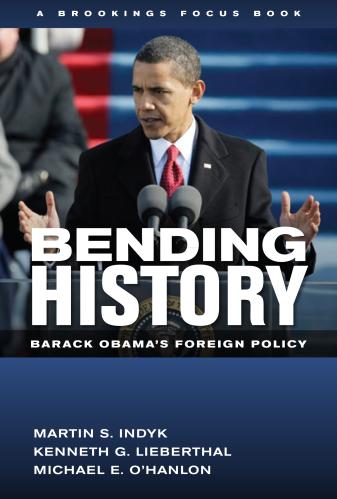
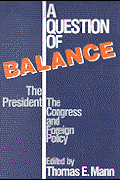

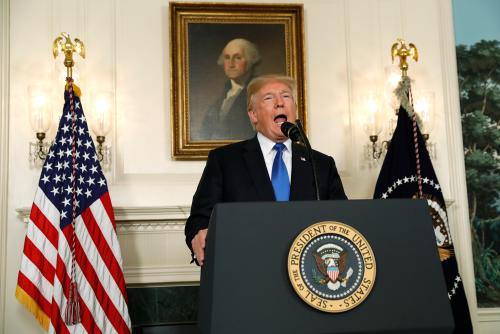
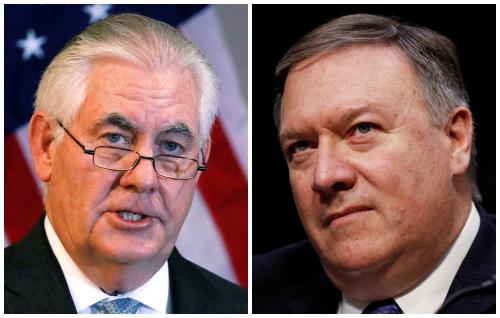
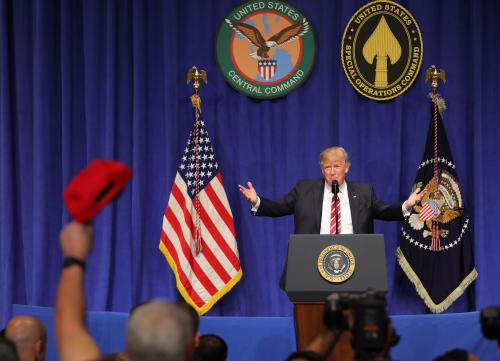



Commentary
Trump is taking foreign policy into his own hands. Will Congress respond?
March 14, 2018